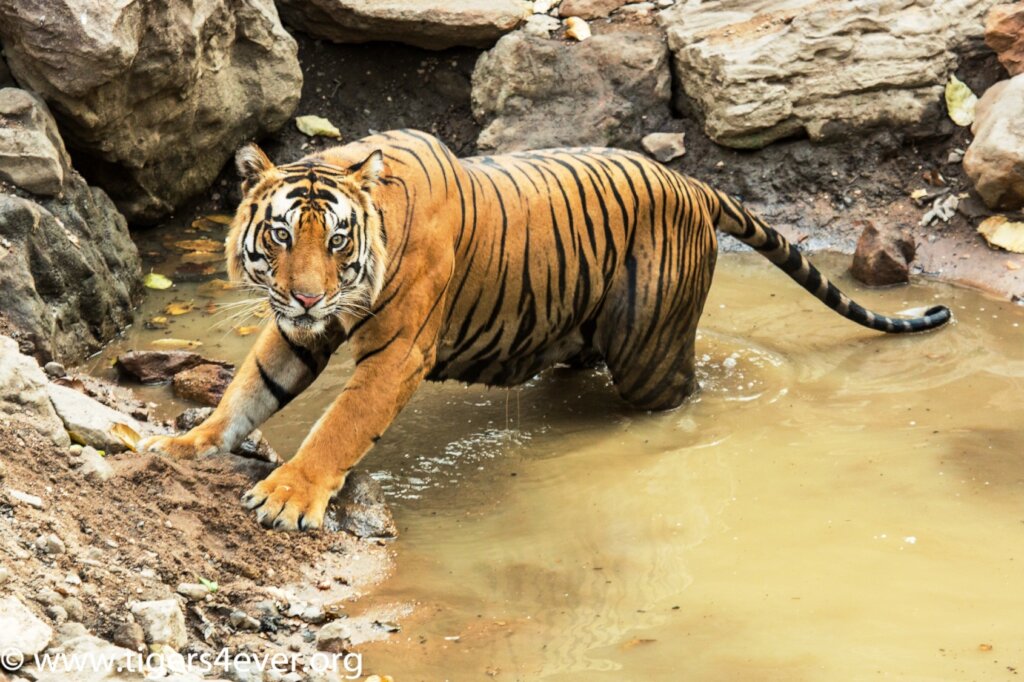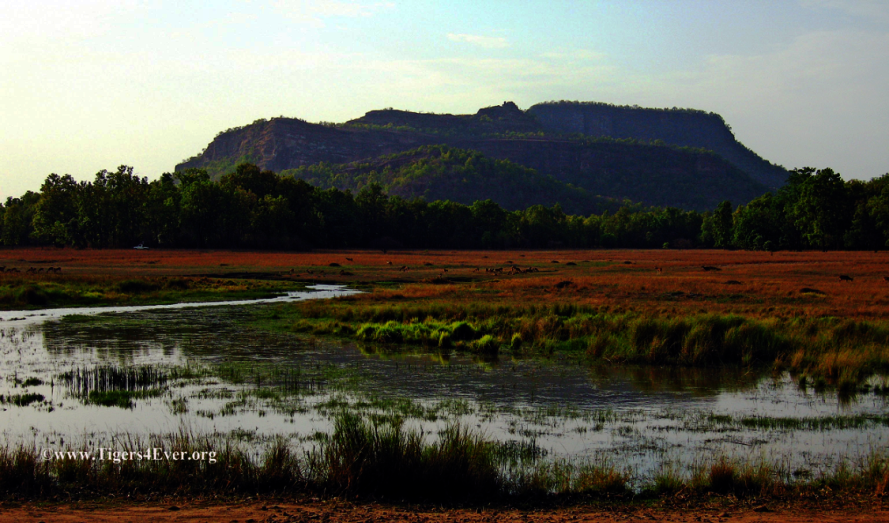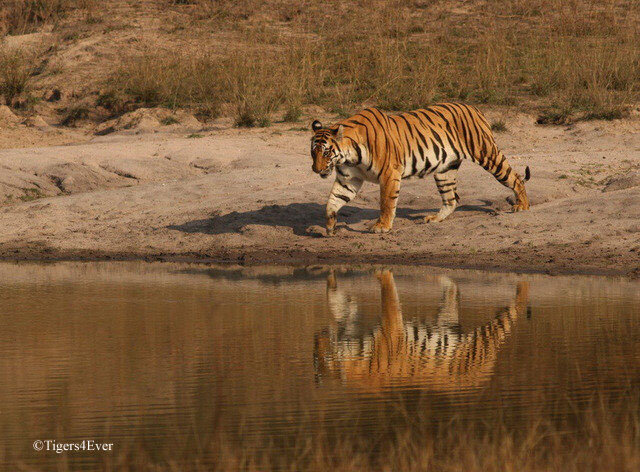By Dr. Corinne Taylor-Smith | Project Leader
We continue to be amazed by your tremendous support for our anti-poaching patrols, during these challenging times. Thank you, without your help and generosity our Anti-Poaching Patrols would already be reduced to critically low levels. This is always a major concern for us when our reserves become depleted as poaching of both wild tigers and their prey is continually increasing in Madhya Pradesh and throughout India. Your generosity and grant funding received from Olsen Animal Trust have ensured that we could maintain quadrupled patrolling throughout the monsoon period, which is also peak poaching season. As a small charity, we rely heavily on individual donors like you to deliver our essential services. Your donations are vital in ensuring that the growing wild tiger and cub population continues to get the best protection we can provide.
Tiger Deaths are on the Increase
In July 2023, the results of the 2022 Tiger Census were announced and confirmed that three quarters of all the wild tigers on earth roam freely in India. Good news for conservation efforts, but sadly good news for poachers too. The census confirmed 3167 wild tigers in the whole of India (785 of these are in Madhya Pradesh which is the largest state population). The wild tiger population in Bandhavgarh has quadruple from 37 in 2010 when our efforts to give them a wild future commenced. We couldn’t have achieved this success without your help.
The number of wild tigers dying is increasing too. As wild tiger numbers grow there will always be an increase in the number of natural deaths because more wild tigers need more wild space and fights for territory become more frequent. This is the lore of the jungle and is something which is hard to curb without forest expansion or improvement schemes. We have been working behind the scenes for some time on forest rehabilitation initiatives but launching such a large project during a cost-of-living crisis could see it fail before it could make a real difference. We haven’t given up hope, we are just looking at other funding options to see what is possible. In the meantime we continue to improve existing wild tiger habitat and reduce both human-wildlife and tiger-tiger conflict through our waterholes project:https://www.globalgiving.org/projects/water-for-bandhavgarhs-tigers/. The number of new cubs born and surviving is also increasing so we will reach a critical impasse soon.
Since the beginning of 2023 there have been 132 reported wild tiger deaths in the whole of India (NTCA statistics at 04 September 2023), of these 53 have occurred since our last report including 6 in Bandhavgarh. Three of the deaths were due to tiger-tiger conflict within the reserve whilst the other three deaths resulted from conflict as the young tigers migrated in search of new territory. Thankfully, our patrolling is keeping unnatural deaths at bay in Bandhavgarh right now but we cannot afford to let down our guard.
Our patrols report the weekly removal of wires and snares set to capture wild boar and other prey animals as the enter the villages to raid the farmers crops and livestock fodder. In the past these wires and snares have killed tigers and their cubs too as they follow their prey into the villages in search of their own food. Wherever possible we use best endeavours to keep both tigers and prey out of the villages as this helps us to remove the risk of retaliatory poisoning too. It has been quite challenging in the monsoon season as heavy rains have washed away forest tracks and roads making some areas impossible to access without appropriate waterproof kit for foot patrols. Thankfully, thanks to the grant of Olsen Animal Trust and your kind donations we have been able to provide full sets of waterproof clothing for the remaining 455 anti-poaching patrollers since the end of May 2023: https://www.globalgiving.org/projects/protecting-tiger-protectors/reports/?subid=219672. Our focus now is on providing warm winter jackets for the remaining 570 patrollers who are without: https://goto.gg/56553.
Strange Weather
We previously reported the strange weather patterns which we have seen in Bandhavgarh this year with heavy rainfall coming in bursts from the end of March onwards. We don’t know yet whether these patterns will be repeated in 2024 but we do know that there has been a greater need for waterproof clothing, boots and snake rescue kits throughout 2023. We are also expecting a prolonged period of colder weather as the winter season begins. Increased patrolling and strange weather patterns mean that patrolling equipment needs are constantly changing and increasing too. During the forthcoming GlobalGiving LittleByLittle fundraising campaign we will be asking our supporters to help with small donations of whatever they can afford, as GlobalGiving will be offering a 50% bonus matched donation on online donations up to $50 (£40) between 18 – 22 September 2023. Please help if you can:https://goto.gg/56553. Each $30 (£22) donation we receive will ensure that we can protect one anti-poaching patroller from the bitter cold winter conditions of early morning and night patrolling. Every warm jacket means one more patroller can walk a patrolling beat and keep wild tigers safe.
Heavy rains make conditions underfoot much more treacherous for both foot patrolling and the patrolling vehicle. They also wash away footprints which makes tracking poaching activities more difficult. Thunderstorms often disable power lines which poachers can use to their advantage when tethering snares and disguise the power outage as weather related. This is why increased patrolling is absolutely essential during the monsoon and rainy season.
Further Challenges Ahead
In recent months, three migrating wild tigers died from territorial fights, these deaths were a tragedy in their own right and were compounded by the poachers killing two more tigers beyond the Bandhavgarh boundary! Both tigers were young adults migrating from Bandhavgarh in search of new territory when the poachers struck. Such incidents reminded us how difficult it is to keep the poachers at bay 100% of the time. We don’t currently have either the funds or patrolling resources to expand the area which we patrol, as our team is already stretched to the limit with the quadrupled monsoon patrolling workload. It is a dilemma; we don’t want to lose more migrating tigers but we also don’t want to reduce the protection in the areas we currently patrol. Just to add another 78 miles (125km) to our patrolling area would cost another £123 (US$160) per day, which right now is impossible.
Fundraising to cover our current patrolling costs is quite challenging so we don’t anticipate being able to extend our patrolling further until the cost-of-living crisis ends. Poachers know that many of the cubs born during the lockdown are now old enough to leave the protection of their mothers and make their own way in the world. These vulnerable youngsters will face many challenges in their quest for a territory to call their own, not least sibling rivalry and aggression from their own parents. They will also face battles with other young adult tigers seeking to establish their own territories and other adult tigers which have already staked their claim. As these young tigers migrate further afield, our brave men and women patrollers will risk their lives to keep them safe. It will be quite a challenge to protect them all. Our patrollers have worked so hard over the last three years as poaching has increased to a 15-year high. It is nothing short of a miracle that we’ve been able to keep so many wild tigers safe.
Increasing Awareness
We have developed bi-lingual educational resources with forest safety infographics for all age groups, which are currently being distributed by our anti-poaching patrollers as they patrol around the villages and when they meet villagers in the forest. These village notices and handouts provide safety information in a format similar to the safety cards many of us are familiar with from our own travels. We also want to develop an audio resource in the future which can be delivered by volunteers in the villages as part of a wider awareness and environmental protection programme.
Patrollers need help too
As the monsoon rains come to an end, patrolling conditions will change from a need for waterproof clothing and boots plus snake rescue kits to needing warmer winter clothing and boots. We have just equipped our patrolling team with new uniforms and sturdy winter boots ready for the winter patrolling, so are now turning our attention to warm winter jackets for the brave men and women patrollers who don’t have one yet. There are still 570 brave patrollers without this vital equipment, so we must work hard to raise enough funds to equip as many as possible in the next few weeks! To provide this vital equipment for all 570 patrollers we would need to raise another £12540 (US$16300) as quickly as possible. This would help us to ensure that every patroller can carry out their vital duties as freezing cold conditions arrive: (https://goto.gg/56553).
Without this vital equipment, patrolling will cover shorter distances as the cold temperatures bite: leaving wild tigers and their cubs vulnerable to poachers’ snares and traps. Where possible we’ve tried to share warm winter jackets between two patrollers (one day shift/one night shift) but this isn’t a long-term solution as the cold conditions persist for days on end. If you can help, each warm winter jacket costs just £22 ($30) https://goto.gg/56553 and will not only keep a patroller protecting wild tigers for 12 hours per day but will provide much needed employment for up to 6 people living with wild tigers who make and distribute the jackets too.
Wildlife and Human Casualties
The last few months have seen an increase in both human-wildlife conflict and Tiger=wildlife conflict around Bandhavgarh. This resulted in deaths of both tigers and humans. Since our last report, three people have been killed by wild tigers with an aggressive male tiger implicated for the two most recent deaths. As the wild tiger population continues to grow, the struggle to find sufficient territory to call home will intensify, and incidents like these will increase in frequency, until more water and habitat can be provided to curtail the conflict. Our work to provide two more permanent wildlife waterholes has been paused due to the monsoon rains. We did, however manage to complete work at a large waterhole in the buffer forest where all seasonal water sources were already bone dry prior to the monsoon. This waterhole will benefit at least 7 tigers and their cubs, plus wild elephants. We are also surveying another dry area of forest in the Dhamokhar buffer forest to provide year-round water in a large waterhole midst the territories of 9 tigers. Hopefully, we can start work on that project too when the monsoon rains subside. (https://goto.gg/34315).
When these incidents are coupled with the increased risk of poaching activities, it means that our patrollers continue be on high alert at all times. We must, therefore, ensure that we can maintain a minimum of tripled patrolling especially throughout the next six months when we know that the poachers will be very active. https://goto.gg/28767.
Making a Difference
Thanks to your continued support, we cover an extra 2000 km (1248 miles) of wild tiger territory per month with our quadrupled monsoon patrols. Without the vital equipment needed to beat the winter weather conditions, this could reduce until the warmer drier weather returns. During the patrolling, it is essential to ensure sufficient time to search for snares; traps and signs of poisoners around forest areas where human encroachment is widespread as poachers are more active. We also need to maintain our patrols around the periphery of villages where crop raiding and livestock killing is also rife. Our increased patrolling helps us to curb human encroachment into wild tigers’ territories and allows us to provide safety advice for those trying to protect their crops and livestock from wandering elephants and tigers respectively.
With almost half of the 60 tiger cubs born since the lockdown now reaching young adult stage, we have many more wild tigers to keep safe, so your help is crucial. Your gift today, however large or small can make a huge difference as to whether Bandhavgarh’s wild tigers can survive the unprecedented threats they face:
Making your Gift Count Twice or More
Your new online monthly gift of £12 (US$16) per month won’t just help us to pay an anti-poaching patroller protecting wild tigers for 35 days per year; it will also qualify for a 100% match bonus on the first donation amount if you keep donating for 4 months or longer. That means when you donate at £12 (US$16) monthly in month 4 we will receive an extra £12 (US$16) from GlobalGiving to help us save wild tigers. Thus, there has never been a better time to start a new monthly donation than now. (https://www.globalgiving.org/projects/saving-bandhavgarhs-wild-tigers/?show=recurring). From 18 – 22 September 2023, GlobalGiving is adding a 50% matched funding bonus to all new online donations we receive up to the value of $500 (£40), whilst bonus funds are capped at $25 (£20) on all donations above $50 (£40): https://goto.gg/28767. This is an excellent time to give, especially if you can make a donation during the LittleByLittle campaign as your impact for the wild tigers will be so much greater.
Without our help, we know that more wild tigers will die; and more humans will be mauled or killed due to encroachment or human-tiger conflict. Sadly, with every human life lost comes another threat to the wild tiger’s survival in the form of retaliation; thus we must protect both if we are to ensure that wild tigers can have a wild future.
Please don’t hesitate if you can help, your donation can be the difference between life and death for a wild tiger, as it helps to increase our patrolling when it is most needed. Every tiger and every tiger cub counts. Thank you for making our fight against poachers, the changing climate and human-animal conflict possible. (https://goto.gg/28767).
Links:
Project reports on GlobalGiving are posted directly to globalgiving.org by Project Leaders as they are completed, generally every 3-4 months. To protect the integrity of these documents, GlobalGiving does not alter them; therefore you may find some language or formatting issues.
If you donate to this project or have donated to this project, you can receive an email when this project posts a report. You can also subscribe for reports without donating.
Support this important cause by creating a personalized fundraising page.
Start a Fundraiser

